
A battle over the death penalty is brewing in Florida, where Orange-Osceola State Attorney Aramis Ayala has announced her office will no longer seek the death penalty in any murder cases, including in the case of Markeith Loyd, who is accused of murdering his pregnant ex-girlfriend, Sade Dixon, and Orlando police officer Debra Clayton. Ayala’s announcement sparked immediate backlash from the police union and Florida Governor Rick Scott, who called on her to recuse herself from the Loyd case. When she refused, Scott signed an executive order removing her from the case and reassigning it. Now Ayala, the first African-American state attorney in Florida history, has been receiving death threats, including from local government employees. We are joined by Angel Harris, assistant counsel at the NAACP Legal Defense Fund.
Transcript
AMY GOODMAN: We end today’s show in Florida, looking at the escalating battle over the death penalty. This month, Orange-Osceola State Attorney Aramis Ayala announced her office will no longer seek the death penalty in any murder cases, including in the case of Markeith Loyd, who’s accused of murdering his pregnant ex-girlfriend, as well as Orlando police officer Debra Clayton. This is State Attorney Aramis Ayala.
ARAMIS AYALA: I would like to address how my office will be handling death penalty cases going forward. In just over a year, Florida’s death penalty statute has twice been ruled unconstitutional. … While I currently do have discretion to pursue death sentences, I have determined that doing so is not in the best interest of this community or the best interest of justice. After careful review and consideration of the new statute, under my administration, I will not be seeking death penalty in cases handled in my office. Let me be very clear, however: I will continue to hold people who do harm to this community accountable for their actions. I will do so in a way that is sensible, fair and just.
AMY GOODMAN: State Attorney Aramis Ayala’s announcement sparked immediate backlash from the police union and the Florida governor, Rick Scott, who called on Ayala to recuse herself from the Loyd case. She refused. The governor then signed an executive order removing her from the case and reassigning it to another state attorney, Brad King. Ayala responded by filing a stay of the governor’s order, arguing he does not have the right to remove her from the case.
In the meantime, Ayala, who is the first African-American state attorney in Florida history, began receiving death threats, including from local government employees. The assistant finance director of the Seminole County Clerk of Court’s Office, Stan McCullars, wrote on Facebook, “Maybe she should get the death penalty. … She should be tarred and feathered if not hung from a tree,” unquote. McCullars resigned after issuing the threats. The Orlando Sentinel reports that from 1877 to 1950, more than 331 black people were lynched by whites in Florida—the most lynchings per capita of any state in the country.
For more, we go to Tampa, Florida, where we’re joined by Angel Harris, assistant counsel at the NAACP Legal Defense Fund.
Welcome to Democracy Now!, Angel. Can you talk about this case and the significance of State Attorney Ayala’s stand?
ANGEL HARRIS: Absolutely. First off, thank you for having me. One, we, first, applaud her for standing up and saying that she will not continue to perpetuate a system that we know has many flaws. In her interview, she pointed out, one, it is not a benefit to society, nor does it promote public safety. Additionally, she says it’s not a deterrent to crime. And I believe and agree with her on all of those things.
We also must look at the racial disparities of the death penalty. And I think it’s very relevant when we’re looking at the state of Florida and we look at not only how many individuals are on Florida’s death row, but when we look at exonerations. There are a total of 157 exonerations from death row. So those are individuals who were sentenced to death, told they deserved to die, and then, years later, they were exonerated for various reasons. Of that 157, 52 percent of those are African-American. When you look at Florida specifically, 26 of those 157 exonerees were from the state of Florida. Nearly 60 percent of those are African-American.
So, when you add that on top of the already inherent shortcomings of the death penalty, it’s not a surprise to me that she would make such an announcement, particularly when we look at the Hurst v. Florida case, that was recently in the Supreme Court, where the Supreme Court struck down the way that Florida is administering their death penalty. Formerly, Florida, a judge would make the decision, over the jury, about whether or not someone would get the death penalty. Florida lawmakers then changed that law to have nonunanimous juries. So, 10 to 2, a jury could give someone death. The Florida Supreme Court struck that down. So there has been a legal battle over the death penalty as it’s administered in Florida. So, I think, in good conscience, she felt she could not do that.
And we really—it’s ironic when you hear about her also receiving death threats, when you think about the legacy of lynchings in this country, and, as you stated, when you think about the legacy of lynchings in the state of Florida. At the NAACP Legal Defense Fund, we represented the Groveland Boys, who were accused of raping a white woman, and they were essentially called to be lynched during that time. And there is repeat history of black men in this country being lynched. Lynching was used as a form of social control, which is what the death penalty is being used for now. So it’s time for us to really pull back the curtain and look at the shortcomings of the death penalty. It’s not accomplishing what a lot of folks are being told that it’s accomplishing.
AMY GOODMAN: Angel, critics say that Ayala is breaking the law by saying that she won’t seek the death penalty. Is this true?
ANGEL HARRIS: No, absolutely not. A state attorney has the discretion to make that decision. There is mandatory death sentence—that is not an option in the United States any longer.
AMY GOODMAN: And—and—
ANGEL HARRIS: So she—go ahead.
AMY GOODMAN: Very quickly, the difference between the response to the killing, his killing of the ex-girlfriend and the police officer? And we only have 15 seconds.
ANGEL HARRIS: OK, sorry. Yes, I mean, I think that also shows another inherent shortcoming of the death penalty. It really depends on the victim. When there was the accusation that he killed his ex-girlfriend, there was not a manhunt. People weren’t looking for him. People weren’t calling for him to get the death penalty. But when there is the killing of a police officer, there is the calling of a death penalty. And so, it just shows that it’s an arbitrary system, and not everyone who murders someone gets the death penalty. It’s an arbitrary system.
AMY GOODMAN: Angel Harris, we’re going to have to leave it there, and thank you so much for being with us.

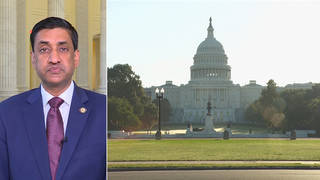
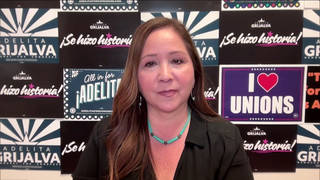
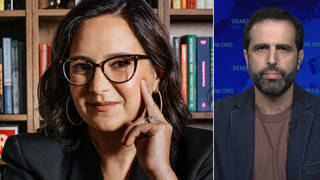
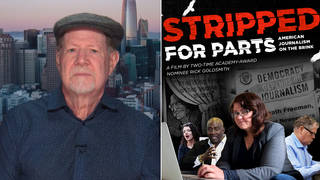





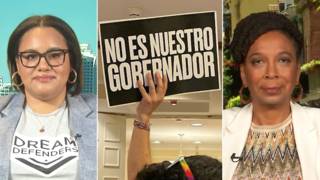

Media Options